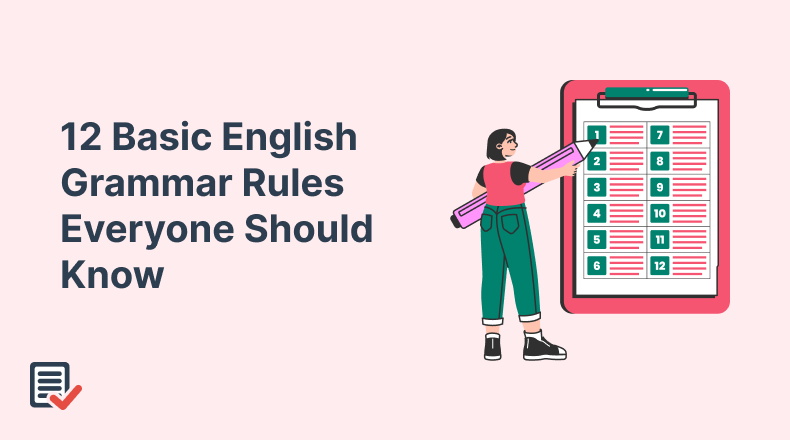
In writing, everything matters a lot. Even minor details make a huge difference, and ignoring them can ruin the beauty of your content. Normally, content creators, students, and even professionals undermine the importance of grammar. As a result, their content fails to captivate readers’ attention and convey the original message.
Did you know what’s the biggest grammar mistake that many writers make? The answer is improper capitalization.
People often don’t capitalize the words they need to. And sometimes, they unnecessarily capitalize a few words they should not. Do you want your work to shine? Then, avoid making such errors. Instead, learn capitalization rules and follow them.
In this post, we will discuss the 15 most important rules of capitalization. Let’s get into the details of these rules.
Essential English Capitalization Rules You Must Know
Capitalization rules aren’t tricky at all. However, many just don’t know them. That’s what creates issues for them.
Here are some cases when you need to capitalize some words.
1: First Word of Each Sentence
It’s a well-known fact. Almost everyone, even non-natives, is well aware of this rule. Also, no one breaks it unless they try to do something creative. Besides that, everyone who writes any type of content adheres to this rule. Even if someone doesn’t capitalize the first word of the sentence, the word processing tools automatically correct it. Therefore, we don’t find such mistakes in any content.
Examples:
- Underdeveloped countries are not underdeveloped; they are overexploited.
- Almost every smoker knows the side effects of smoking.
2: All Proper Names
Besides the first word of sentences, writers must also capitalize the proper names. Whether it’s the name of a person, city, or country, you have to capitalize them at all costs. Also, you have to capitalize all first, middle, and last names.
Examples:
- Canberra is the capital of Australia.
- Elon Musk has bought Twitter and changed its name to X.
3: Titles of People
Generally, many people make this mistake. They don’t capitalize the titles. President, Dr., Professor, Sir, and Senator, are the common examples of titles. If you also make this mistake, remember that it’s always essential to capitalize the titles. However, when such words are not used with a person’s name, don’t capitalize them.
Examples:
- This research article was supervised by Professor Green.
- Everyone was impressed by President Lincoln’s bold decisions.
- Various doctors attended the meeting last night.
4: Acronyms
Acronyms are the abbreviations of initial letters of different words, phrases, or names. Each letter in an acronym represents a word. You should always capitalize acronyms. Capitalize them to indicate that you are discussing that particular organization or term.
Examples:
- WHO helps people combat different diseases.
- CIA operations are generally highly classified.
- Most citizens aren’t satisfied with the IRS.
5: Brand Names
Remember, brand names are also proper names. So, when you write a brand name, capitalize it. This practice can help you properly acknowledge them. Also, use the uppercase with some specific products or models of companies. However, if a brand doesn’t use the uppercase with its name, you should respect it.
Examples:
- Google and Microsoft have contributed a lot to making our lives easier.
- I visited the Nike store last night.
6: Salutation and Closing in Letters
Whether you are writing an email or a letter, capitalize every word of salutations and closings. No matter for what purpose you are writing a letter, application, or email, it must be capitalized. Even when writing in an informal tone. Often people don’t capitalize them. It reflects unprofessional behavior and leaves a bad impression on readers.
Examples:
- Hello Team,
- Greetings Donald,
- Thank You,
7: Events and Periods of History
Many students and even professional writers don’t know about it. So, when talking about historical events and periods, they don’t capitalize on them. Remember this rule whenever you write about wars, eras, revolutions, movements, or any other historical event. By doing so, you emphasize their importance and distinguish them.
Examples:
- The Civil Rights Movement reshaped American society.
- Ancient Egypt was a powerful civilization
- Muhammad Ali refused to participate in the Vietnam War.
8: Geographic Regions
It’s a bit of a confusing rule for many. You may have read that sometimes directions like south, north, east, and west are written in lowercase. However, sometimes they are capitalized. When you talk about compass directions, use lowercase. On the other hand, when you talk about specific regions, or they are part of proper names, capitalize them.
Examples:
- The South is culturally very rich.
- We moved to the East Coast last month.
- She is traveling west.
9: Important Words in Titles of Works
When writing about a book, movie, song, or any other creative, artistic, or literary work, capitalize all the main words. For instance, you should capitalize all the nouns, pronouns, verbs, adverbs, and adjectives. However, not every word deserves to be capitalized. When writing titles, don’t capitalize articles, conjunctuions, and prepositions.
Examples:
- The Lord of the Rings
- Pride and Prejudice
- To Kill a Mockingbird
10: First Word of a Quote
No matter where it appears in a sentence, the first word of direct quotes must be capitalized. Often, students make this mistake. When writing a quote in the middle of a sentence, they don’t capitalize the first words. Don’t make this mistake; it can make your overall work look unprofessional.
Examples:
- The Doctor said, “You have to quit smoking immediately.”
- “Do you like Italian food?” she asked.
- He whispered, “It’s a secret.”
11: Nationalities, Languages, and Religions
In English, it is essential to use the uppercase with nationalities, languages, and religions. Such things are proper nouns; unfortunately, many people don’t realize it. Also, such things represent specific cultures, identities, and beliefs. Therefore, whenever you write about them, make sure to capitalize them.
Examples:
- I speak French fluently.
- I have recently attended a Hindu festival.
- Do you practice Christianity?
12: The Pronoun “I”
Examples:
- John and I went on a hiking trip.
- How can I help you with that?
- She asked, “Can I join you?”
13: Days, Months, and Holidays
The names of the days, months, or holidays are also proper nouns. Therefore, they also need to be capitalized. Thus, when you write about them, capitalize the first letter.
Examples:
- I was born in September.
- Chris is planning a party on New Year’s Eve.
- I am only available on Sunday.
14: First Letter after Colon
The first letter after a colon should also be capitalized. Actually, the clause after the colon is a complete sentence. Therefore, it must be started with a capital letter.
Examples:
- She made a bold decision: Leave the city and move to the countryside.
- The message was clear: Do not enter the building without permission.
- Pep’s goal is clear: Win another Champions League with Manchester City.
15: Governmental Institutes
As a writer, you should be aware that the names of governmental organizations must be capitalized. They are also proper nouns and names of different bodies. Therefore, you should not forget to capitalize them.
Examples:
- The Senate passed the bill last month.
- The Ministry of Health is trying to educate people about the health consequences of smoking.
To Conclude:
Mastering English capitalization rules is essential for writing understandable and compelling content. Although many think that the rules of capitalization are pretty confusing, they aren’t. There are some simple rules regarding them. By understanding those rules, you can quickly analyze what words you have to capitalize and what you do not.







